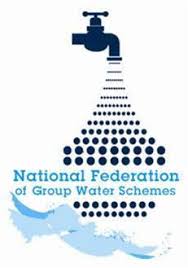The farming community is playing a central role in ongoing efforts by the community-owned group water scheme (GWS) sector in Ireland to improve water quality.
Led by the sector’s representative body, the National Federation of Group Water Schemes (NFGWS), individual GWS’ have been participating in ambitious drinking-water source protection projects that aim to reduce contamination of waterbodies and benefit the wider environment.
Privately sourced group water schemes abstract and treat their drinking water before distributing it to their members. These sources are either from surface waterbodies, i.e. a lake, or from groundwater springs and borewells.
Each source is vulnerable to external pollution factors within its catchment/zone of contribution. The local topography can also be a significant factor, with different soil types, bedrock etc. influencing the source.

Protection plans to prevent pollutant run-off
Through a project funded by the Department of Housing, Local Government and Heritage (DHLGH) and the Department of Agriculture, Food and the Marine (DAFM), 14 group water schemes are creating bespoke integrated source-protection plans that provide a framework for how the GWS sector can work to protect or improve the quality of its source.
The DAFM-funded aspect of the project relates to the implementation of measures to address pressures related to agriculture within a number of the source catchments.
Crosserlough GWS in Co. Cavan is one of the participating group water schemes. The GWS has been working with local farmers to fence-off watercourses to prevent cattle access and to create vegetative buffer zones that are optimally targeted to help prevent pollutant run-off.
Group water scheme World Water Day
In March, the GWS hosted a special World Water Day event, which shone a light on the work of the project in Crosserlough and on other group water schemes around the country.
The day included an outside local radio broadcast, catchment walks and a training course for farmers on best practices when applying pesticides on their land.
The current ISPP project builds on the learnings of a NFGWS source protection pilot project, which included a number of group water schemes in Co. Roscommon, as well as Stranooden GWS in Co. Monaghan and Multyfarnham GWS in Co. Westmeath.
Again, the project’s success relied on the involvement of farming families and their commitment to working with their local GWS to help protect its drinking water source.
Many of the measures implemented in relation to source protection also have co-benefits for the wider environment, particularly in relation to biodiversity enhancement and climate action. Buffer zones provide habitat for wildlife, food for pollinators and capture carbon.
Education and awareness initiatives, e.g. ‘I’ve planted a tree and my garden is pesticide free’, educate members about the dangers of pesticides to both water quality and biodiversity.
By taking a whole of environment approach, group water schemes are encouraging more widespread involvement and highlighting the link between our everyday habits and the quality of our waterbodies.
This week, September 5-9, 2022, is Rural Water Week. Organised by the NFGWS, it showcases the ongoing work of the sector and encourages wider participation from group water scheme members in their local GWS activities.
To keep updated throughout the week and to find other useful information on drinking water source protection, click here.

